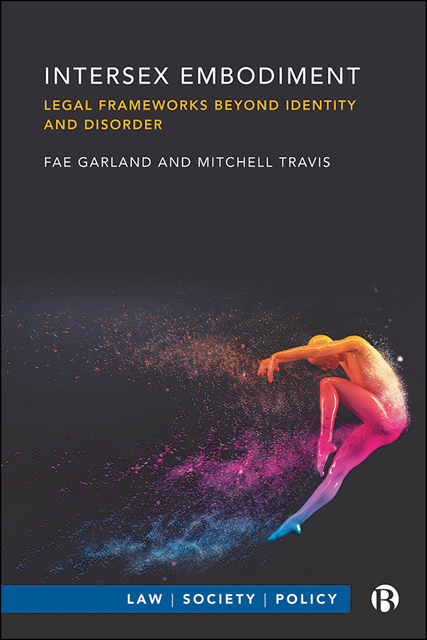Book contents
- Frontmatter
- Dedication
- Contents
- Series Editor’s Preface
- List of Abbreviations
- Acknowledgements
- 1 Introduction: Embodying Intersex
- 2 Medical Embodiment: Intersex as Disorder
- 3 Non-Binary Embodiment: Intersex and Third-Gender Markers
- 4 LGBT Embodiment: Queerness, Homonormativity and Anti-Discrimination Law
- 5 Engaging with Intersex Experience: Can Law Disrupt Medical Embodiment?
- 6 Intersex as Acceptance and Emergence: Can Psychosocial Frameworks Disrupt Medical Embodiment?
- 7 Conclusion: Intersex Embodiment
- References
- Index
5 - Engaging with Intersex Experience: Can Law Disrupt Medical Embodiment?
Published online by Cambridge University Press: 17 June 2023
- Frontmatter
- Dedication
- Contents
- Series Editor’s Preface
- List of Abbreviations
- Acknowledgements
- 1 Introduction: Embodying Intersex
- 2 Medical Embodiment: Intersex as Disorder
- 3 Non-Binary Embodiment: Intersex and Third-Gender Markers
- 4 LGBT Embodiment: Queerness, Homonormativity and Anti-Discrimination Law
- 5 Engaging with Intersex Experience: Can Law Disrupt Medical Embodiment?
- 6 Intersex as Acceptance and Emergence: Can Psychosocial Frameworks Disrupt Medical Embodiment?
- 7 Conclusion: Intersex Embodiment
- References
- Index
Summary
Introduction
The last two chapters have traced the problems inherent to law and policy framing around intersex embodiment and the consequences of their enactment. Within law, intersex embodiment is most frequently constructed through lenses of LGBT and non-binary embodiment. Perhaps unsurprisingly then, states have turned to anti-discrimination legislation and third markers to redress perceived status disadvantages for intersex people. However, as this book demonstrates, understanding intersex embodiment solely through these lenses is fraught with difficulties. LGBT and non-binary frameworks are ill-equipped to challenge the paradigmatic construction of intersex embodiment as a disorder and cannot redress the systemic disadvantages that arise from the medical management of intersex bodies. Nor can anti-discrimination laws remedy the scope of rights violations identified by international bodies like the UNCRC and the Council of Europe that these non-consensual medical interventions may result in (Garland and Slokenberga, 2018: 1; Office for the Commissioner of Human Rights, 2019; UNCRC, 2019). At best, then, third markers and anti-discrimination legislation are ineffectual and, at worst, harmful as they distract from and potentially silence the core issue at the centre of the intersex movement: bodily integrity (Carpenter, 2018). The result is that the disorder narrative enabled by medical embodiment is in fact perpetuated and strengthened by such state-led measures.
This chapter specifically addresses the question of whether intersex embodiment is disrupted where the law specifically regulates medical interventions. Unlike the last two chapters, this approach attempts to shift the framing of intersex embodiment to one that draws upon intersex experience (ontology) rather than determining it (epistemology). Since 2015, four states have introduced legislation which directly challenges medical practice and consequently the paradigmatic framing of intersex embodiment as a disorder. In particular, this chapter highlights Malta as the first and longest-standing Western state to prohibit medical interventions on intersex children through legislation in its Gender Identity, Gender Expression and Sex Characteristics Act 2015 (GIGESC Act). The introduction of the GIGESC Act marked a significant moment in intersex legal reform where, for the first time in the West, legislation adopted a children’s rights-based approach to intersex issues centred on bodily integrity, autonomy and self-determination.
- Type
- Chapter
- Information
- Intersex EmbodimentLegal Frameworks beyond Identity and Disorder, pp. 109 - 137Publisher: Bristol University PressPrint publication year: 2022



